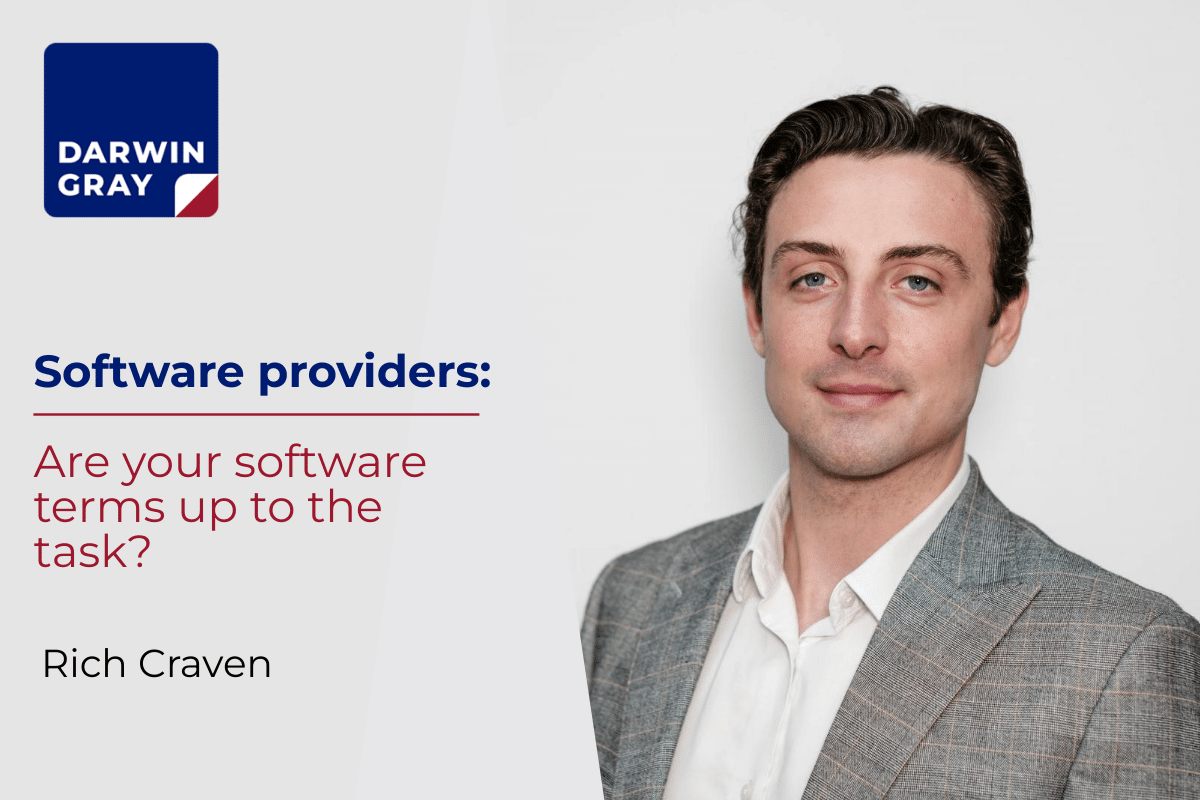September 5, 2023
By Rich Craven
Software providers have become an essential supplier for many businesses. From small start-ups to multinational companies, software solutions are the first point of call for various day-to-day operations.
As a software provider, you may find yourself homing in on an untapped market that clients will rush to use, but hastily keeping up with this demand can be a high-risk prospect. One unhappy client has the potential to result in significant losses for your business. This article will highlight those risks, and reveal how a robust set of standard terms can help protect your business.
The Landscape of Software Terms – SaaS Agreements
Software contracts come in various forms, the most common of which are software-as-a-service (SaaS) agreements. These are similar to many other sets of terms and conditions from a service provider: setting out the obligations when delivering the software and a client’s obligations to ensure proper use of the software.
Standard terms are designed to protect your business in order to avoid any misunderstandings, however any ambiguities or omissions in the terms can lead to disputes, financial losses, and damaged reputations. For a software provider this will be even more significant as the nature of the internet presents risks which can never be completely mitigated.
Common Risk Areas
- Intellectual Property Rights and Licences
One of the primary risk areas as a software provider is intellectual property (IP) rights. The creation of proprietary software can be the backbone of a business’ performance – and it is often key for software providers to protect this to ensure they stay ahead of the competition. The most effective way to do this is ensuring your terms lay out how you expect users to engage with your platform, and what restrictions they must agree to; this is the licence you grant to your customers to allow them to use the software.
Unclear terms related to the IP ownership and the permitted use of the software can leave the door open for unwanted modifications or repackaging of your software which can be a significant hurdle to overcome. Not only will this undermine your platform in the market, it can also open up potential third-party claims resulting from improper use of your software infringing on other’s IP rights.
To address this, your terms should clearly outline the software’s IP ownership, the usage licence granted, and any restrictions with its use. You may also want to consider including an indemnity for any third-party claims that arise due to a client’s misuse of your platform.
- Personal Data
Where software involves the processing of personal data, its standard terms must address how that processing takes place. Improper data processing measures, including a lack of transparency of the processes with your data subjects, can lead to legal and financial consequences, such as hefty fines from the Information Commissioner’s Office for falling foul of data protection legislation.
Your standard terms should outline compliance with data protection laws (such as the UK GDPR), your responsibilities for that personal data (either as a data controller or data processor), and accompanying privacy policies. The extent of your obligations will be determined by whether you are a data controller or a data processor when providing the services.
Altogether, these factors should create one clear, cohesive basis in which you justify the processing of personal data. Setting this out in your terms not only makes this easy to see, it also demonstrates intent to maintain proper processing practices.
- Service Level Agreements (SLAs)
SLAs provides obligations for the continued performance of the software, including expected uptime, response times to client support tickets, and varied support levels. As a provider, SLAs can help assure clients of the functionality of the software and continued support throughout the contract term. However, setting out positive SLAs needs to be balanced with the practicality, and therefore the cost, of maintaining them.
Should a SLA not be met, a client in most cases will expect some form of compensation, either in the form of service credits, or a refund of fees already paid. For repeated breach, the customer is likely to want the ability to terminate the agreement. As a software provider, you should consider whether providing an SLA would support your businesses pricing model, and if so, considerations for what to do should they not be met.
It is generally best practice to include SLAs either as standard, or not at all; providing them for individual clients who are receiving the same service as the rest of your clientele can create internal complications which outweigh the benefits of retaining that individual client.
- Terms, Termination, and Renewals
Many SaaS agreements run on a subscription model that will automatically renew on a monthly or annual basis. Whilst this can ensure a regular stream of income from a client, it can also cause frustrations should they not be aware of their rolling contract. As a provider, you should be clear in your terms that the contract makes clear how the term runs, if it will renew once its initial period ends, and if so what to do to not renew.
You may also want to ensure a client cannot terminate early without cause (termination for convenience), especially if you undertake significant groundwork to get the client’s service up and running.
The above is a run through some of the key risks that arise in a software contract, however each area can contain more complexities than others depending on the nature of your platform.
If you require assistance with any of the above, please contact a member of our commercial team, Rich Craven via email on rcraven@darwingray.com or via telephone on 029 2082 9130 for a free initial chat to see how we can help you.









